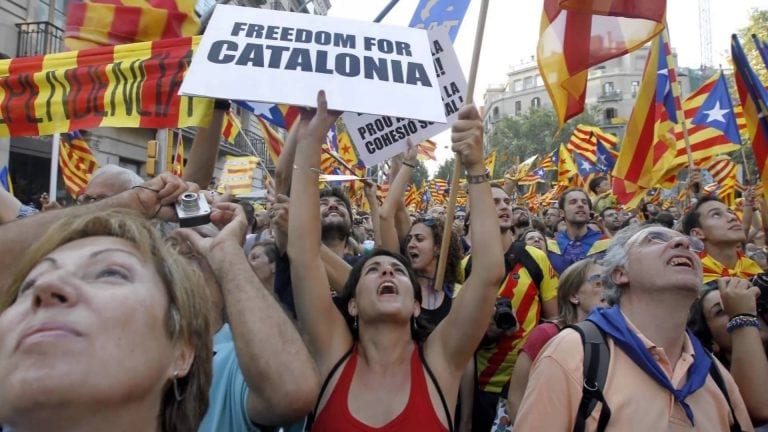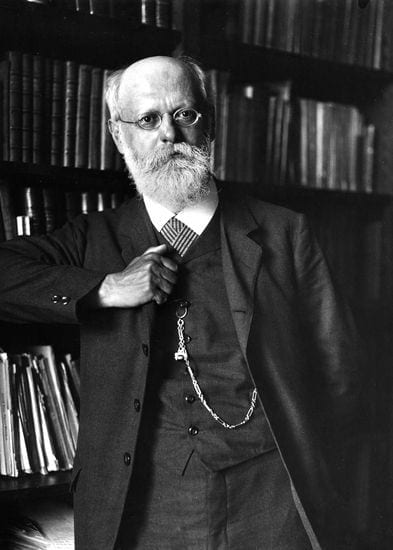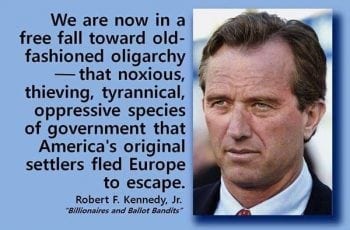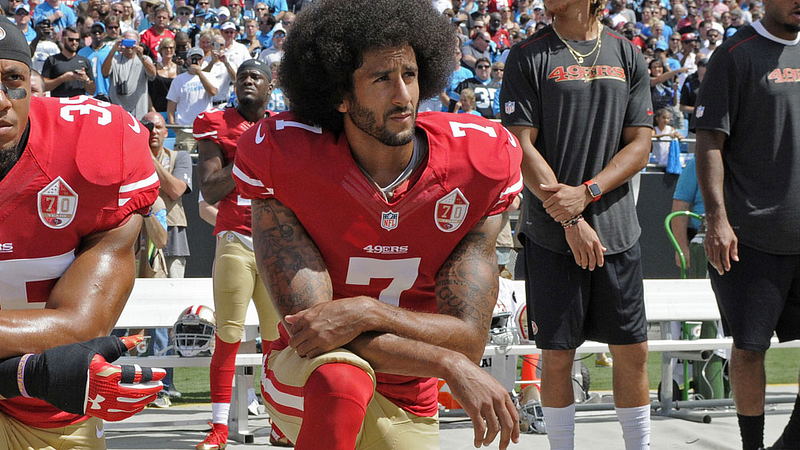To do so, a bit of historical grounding is necessary.

Many Catalonians are being swept by nationalism, but the moment is also one in which masses could seek to inaugurate a new type fo state, not anchored in capitalist exploitation. (Click on image)
In 1978, the current Constitution was adopted. Franco had died, ETA had blown his hand-picked successor to smithereens, and one of the largest wildcat strike movements in world history had completely destabilized the regime. Fascism was no longer tenable; Spain would have to go democratic. The fascists re-stylized themselves as the Popular Party, though this makeover was only made possible by the part of the Left that recognized them as a legitimate political force. This part joined the newly legalized Socialist Party, and they were rewarded by gaining access to power, which they held for the better part of 4 decades, aided by the newly institutionalized labor movement, now organized in legalized unions receiving state money to pay the salaries of full-time officials. The post-fascists won because they got to keep owning the country, and none of them had to go to jail for orchestrating the torture, imprisonment, and execution of hundreds of thousands at the end of the Civil War, and thousands more every time the working class raised its head, right on up into the last years of the regime and the years of the “Transition” to democracy. No, the Hitlers and Goebbels of Spain would die peacefully in their beds, many years later.
Needless to say, the fascist security apparatus was left fully intact by the democratic government. A concomitant trend is that the portions of the Left and the anarchists who didn’t accept this bargain with the devil continued to be surveilled, imprisoned, tortured, and sometimes killed, though now they were designated “terrorists” instead of “Reds”.
The new Constitution was approved in a referendum marred with irregularities. For starters, the population had no input on what kind of government they would get. For most people, voting “yes” was nothing more than voting “no” against the continuation of the fascist regime. It is highly unlikely, for example, that most people, given the choice, would have voted in favor of suddenly having a monarch (yes, that’s right, the post-fascists went out and found a king to give the new democracy more centralization and stability). What’s more, voting rules were changed in the midst of the campaign, some provinces experienced up to 30% irregularities, more than a million people showed up twice on the voting rolls, 300,000 people with a legal right to vote in Madrid didn’t appear at all, and the census data only matched up in 11 of Spain’s 50 provinces. But, in case statistics have meaning, 58% of the electorate had their votes counted, and the recorded result was overwhelmingly in favor of the Constitution.
Needless to say, the fascist security apparatus was left fully intact by the democratic government. A concomitant trend is that the portions of the Left and the anarchists who didn’t accept this bargain with the devil continued to be surveilled, imprisoned, tortured, and sometimes killed, though now they were designated “terrorists” instead of “Reds”.
Though the new democracy was born on shaky ground, the rise of the Socialist Party and the institutionalization of the unions enabled many people who otherwise might have been revolutionaries to get on the government payroll. The drugs suddenly flooding into the inner cities took care of the rest. Meanwhile, political forces in the nations subordinated to the Spanish state—the Catalans, the Basques, the Galicians—decided to support the new Constitution once they won guarantees of regional autonomy. Their languages were no longer banished from the public sphere, and they could have partial control over education, their finances, their infrastructure.
Inevitably, though, a centralizing tendency took hold, and the government in Madrid limited the autonomy of the regional governments through a series of laws, court orders, and executive privileges. In 2006, a Statute of Autonomy was approved in a popular referendum in Catalunya, reinforcing the original spirit of local governance. Spain’s Constitutional Tribunal, however, annulled 14 articles of the Statute and rewrote another 27, mocking the Catalan pretension of self-government within the Spanish state.
Then the construction bubble popped. Since the manufacturing sector had been rationalizing and shedding its workforce for years, this just left the demeaning jobs of the tourism sector. When the market crashed and the government passed harsh austerity measures while bailing out the banks with public funds, the economic engine that bought most people’s loyalty to democracy stopped working, and the repressive engine that had kept the uncontrollables isolated at the margins of society could no longer deal with the growing numbers of the enraged.
What’s more, the Popular Party, in power again, was beset by dozens of corruption scandals tainting most of the leadership and even implicating the royal family, nor were these mundane affairs, but the most brazen scams you could think of, showing pretensions of absolute impunity. One PP leader even “won” the lottery multiple times, acquiring winning tickets in  exchange for piles of cash in order to launder stolen money. Prosecutions mounted up after pressure from the European Union, but multiple PP bigwigs died shortly before or after giving testimony, falling victim to apparent suicides or heart failures. Meanwhile, Spanish prosecutors began going after pro-independence Catalan parties, uncovering a far more orderly form of corruption among Convergència (now the Democratic Party of Catalunya), the conservative Catalan party that for years had charged a 3% rate to private companies in exchange for granting them lucrative contracts.
exchange for piles of cash in order to launder stolen money. Prosecutions mounted up after pressure from the European Union, but multiple PP bigwigs died shortly before or after giving testimony, falling victim to apparent suicides or heart failures. Meanwhile, Spanish prosecutors began going after pro-independence Catalan parties, uncovering a far more orderly form of corruption among Convergència (now the Democratic Party of Catalunya), the conservative Catalan party that for years had charged a 3% rate to private companies in exchange for granting them lucrative contracts.
Spain entered a fully fledged crisis of legitimacy. More and more people remembered the sham of ’78. During the 15M movement, many hoisted flags of the Republic, the government ousted by Franco in the Civil War.
In 2012, mired in corruption scandals and faced with elections, Convergència declared support for Catalan independence from Spain. Until that point, the Catalan independence movement had overwhelmingly been the terrain of small anti-capitalist organizations and youth groups, plus a few large civil society organizations representing a bourgeois take on independence. Now, it became a mass phenomenon. The September 11th demonstration, mourning Catalunya’s conquest by Spain in 1714 and serving as a Catalan national holiday, had long been one of Europe’s largest annual marches, but in 2012 one and a half million people participated (Catalunya’s population is 7.5 million). A month later, Convergència squeezed by and won the elections.
Ruling together with ERC, the Republican Left of Catalunya, a center-left party that also declared its support for independence, they subsequently organized a non-binding referendum and in 2015 a regional election they declared to be a plebiscite on the question of independence, in which a win by pro-independence parties would be interpreted as a mandate for beginning a process of secession from the Spanish state. The pro-independence camp won both of these contests, the referendum with a low turnout and the elections with a high turnout. The latter, however, did not deliver an absolute majority to the pro-independence coalition, Junts pel Sí (Together for the Yes). To form a government, they would have to work together with the CUP, the grassroots, municipalist party formed by those same anti-capitalist organizations that had previously led the independence movement, and which were even more pro-independence than the two big parties.
(For reference, the election gave 62 seats to JxSí, 10 to the CUP, 52 to the three explicitly anti-independence parties, including the two that have ruled Spain since the end of the dictatorship, and 11 to a leftwing platform connected to Barcelona en Comú and Podemos, which have an ambiguous position on independence; in other words, 72 in favor, 52 against, and 11 amenable to some kind of negotiation or reform).
Finally, with the CUP pushing and pulling to keep the other two parties to their timeline, the Catalan regional government held a referendum on October 1st, and the whole world has seen the images of Spanish police beating up old folks waiting in line to vote.
In early September, the Catalan parliament passed a law dictating that independence would be declared within 48 hours of a favorable result. Laws, though, are paper, and this one was set aside. On October 10, Catalan president Carles Puigdemont finally gave his speech announcing the referendum results. He declared independence and immediately suspended the declaration to allow for more negotiations, copying the tactic used by Slovenia in 1990.
From mid-September to mid-October, the Catalan government has been using popular mobilizations and appeals to international mediation in order to defend the referendum and apply the results, whereas the Spanish government has been using legal and police tactics to block the referendum and then to keep the Catalan government from seceding. Most recently, they have imprisoned the leaders of the two most important civil society organizations, the Catalan equivalents of Amnesty or the NAACP.
It is no coincidence that claims to democracy have been so central to the ongoing war of ideas. Confidence in democracy throughout the Spanish state had been thoroughly undermined. People were rising up and fighting against the established order with increasing frequency. Except for the radical fringes, they were not positioning themselves against democracy, based on an even-keeled assessment of what democracy had given them; instead they were making an unsubstantiated historical claim that this was not democracy, democracy was something else.
Now, the political leaders of both sides of the conflict are promising to give the people democracy, and in stark contrast to the horizontal, leaderless movements of the last years, most people have rewarded them with their enthusiasm and their attention. Democracy has once again become an engaging spectator sport. And one of the most worrisome developments of this turn of events is that nationalism has proven to be the chief mechanism by which democracy is made participatory again.
Theoretically, this should come as no surprise. Democracy has always been a nationalistic and militaristic form of government; in fact, modern democracy and the nation-state share the same historical roots. It makes perfect sense. If authoritarian political power must be legitimated by “the people”, elites will fight—and most of all get us to do their fighting for them—over who constitutes the people and who is an outsider. (Immigrants, for example, didn’t get to vote in the independence referendum.)
This is not to say that the present conflict is a contest between two symmetrical sides. Spanish nationalism and Catalan nationalism in the present context bear few similarities. For weeks before the referendum and the first days after it, the largest popular demonstrations in favor of “Spanish unity” were organized and attended primarily by neo-Nazis and fascists, and even when more respectable political forces took over, ultras within the crowd attacked journalists and people of color with near impunity whereas huge masses chanted in favor of Franco or called for Catalan politicians to be sent to the gas chamber.
As is usually the case with independence movements of historically oppressed nations, the current wave of Catalan nationalism spans the political spectrum and includes most social justice activists. Cases of pro-independence voters applauding those who arrived to vote draped in Spanish flags have been widely publicized; their ideal is one of pluralism rather than forcible unity. Nonetheless, this movement also excludes people, and pro-independence demonstrators claiming to be nonviolent have beaten up or silenced individuals they considered external to “the people”.
So whose claims to democracy are more legitimate?
Technically, the Spanish government is 100% correct when it claims the Catalan referendum is “illegal”. The Spanish Constitution does not allow autonomous regions to carry out independence referendums. It does allow the Constitutional Tribunal to invalidate laws that go against the Constitution. The Tribunal did just that with the referendum law and all related laws.
Other Spanish claims are weaker. They claim the Catalan government is not respecting the will of the population, but polling in the months before the vote consistently showed that a majority of the residents of Catalunya were in favor of holding a referendum. And now, after being beat up by Spanish police for trying to vote, after seeing their grandparents shot with rubber bullets, heads cracked open, fingers intentionally broken, people dragged by their hair, and young women sexually assaulted by smirking cops, a solid majority is now in favor of independence, whereas before opinion was split down the middle.
The government in Madrid also decries irregularities in the referendum, such as last minute changes to voting procedures, or points to the low voter turnout (43%). This is hypocritical on several counts. Irregularities in the Catalan referendum were lesser than those in the referendum that approved the Constitution Madrid now wields as the source of its legitimacy. It’s also a cheap argument because the Spanish police were doing everything they could—raiding printers, seizing ballots, shutting down websites, threatening poll staffers, arresting technicians and politicians—to make the referendum impossible. The fact that the Catalan government pulled it off with so few irregularities is a major triumph for them, and an embarrassment to the Spanish state. And the fact that 2.2 million people voted, when doing so meant exposing themselves to police violence, when some 300 polling stations were closed by force, when all the major media were constantly bombarding them with assurances of all the disasters that would befall Catalunya if it seceded, with the central government promising that any results would be null and void, is a triumph for democratic participation, and this is coming from someone who believes that the referendum and democracy in general are a sham.
The PP’s model of democracy is based on “the rule of law,” the mythical—in fact, historically disproven—idea that without clear laws that everyone follows, society descends into tyranny and cannibalism. To have rights, to have security, to have life, we need to respect the rule of law. The problem with this view is that law is always based on conquest. To be more precise, law is either conquest or the posterior legitimation of conquest. In other words, the rule of law is the veneer of the society based on tyranny and cannibalism. The only reason Spain got the Constitution it has today is because on the one hand, there were fascists who had won a bloody civil war and conquered a country, and on the other, there were socialists who felt confident they could control and pacify an insurrectional wildcat strike movement that was making the country ungovernable. The current rule of law in Spain is the result of an unethical back room deal between those two forces. That is the source of Madrid’s legitimacy in sending riot police to beat up old people. This is perfectly “legal” of them, but anyone who takes the law seriously is living in a very silly fairy tale. Although, since Spain has a king, the only thing that’s missing for the fairy tale to become reality is some dragon or troll to fight.
In the US (and any other settler state), the relation between law and conquest is even more obvious. Or has anyone forgotten just what kind of men wrote the US Constitution? What’s more, the relationship between law and democracy is not exclusive. Dictatorships, even fascist ones, also have law codes.
The Catalan government cannot make claims to the letter of the law, so they appeal to the spirit of democracy, which is popular participation and the ritual of the vote. Time and time again, they have used mass mobilizations to underscore the crisis of legitimacy, and every time they have held some kind of election, they have won. Before October 1, hundreds of thousands of people organized across Catalunya to occupy and defend polling stations, directly guaranteeing their right to vote, and nearly half the electorate did vote.
But how is this electorate decided? As mentioned, immigrants were excluded from the vote, a common practice in democracies, as is the exclusion of those younger than 18, an arbitrary, culturally specific limit to personhood. Since Catalan secession would affect the whole Spanish state, why shouldn’t all of Spain get to participate in the referendum? On the contrary, why should one people get to decide the fate of another people, simply by virtue of having conquered them? And if that’s the case, why should Spanish people living in Catalunya get to vote on Catalan independence? Conquerors always resettle populations so that conquered ethnicities remain a minority. How is a majority vote a valid mechanism for self-determination in the face of historical processes designed to destroy the integrity of conquered populations? What about people from the “Catalan countries” outside of the autonomous region of Catalunya, like Valencia and Mallorca? The possible survival of their language and their culture will be directly affected if one part of the Catalan countries wins independence. Yet Valencia, for example, has no chance for an independence referendum, given that the bourgeoisie in Valencia are strictly Spanish.
If Catalan-speaking peoples are only subjected to the Spanish state (and France) because they lost a series of wars, why should Spanish legality have any bearing at all, and why should a referendum be necessary in any way? If everyone voted, and only 40% supported independence, that would only be a reflection of the fact that over the last couple centuries, Spanish institutions have successfully destroyed the identity of a slim but absolute majority of the country they conquered. Doesn’t a referendum, then, simply reward the states that are more effective in carrying out genocide and forced integration, like the US and France, and punish the states that are new at the game?
Since Catalans are only faced with the question of self-determination because they were militarily conquered by Spain, who has the right to tell them their fight for independence isn’t valid unless they attain the symbolic legitimacy of some majority vote?
And if Catalunya wins their independence as a result of the referendum, what is the first thing they will do? Establish a Constitution that monopolizes force and sovereignty within their territory, denying the right of anyone to secede or to hold their own referendums without permission from above. In effect, the good citizens go to vote on self-determination so that their children will not be able to, so that they themselves will not be able to a year later. This model that appeals to the spirit of democracy and the idea of inalienable rights such as self-determination, in the end, is even more hypocritical than the “rule of law” model.
Anyone who studies the subject can see that a vote is pure theater. Most people don’t hold unswerving, idealistic convictions. The result of any vote will depend primarily on the news coverage of the prior week, contextual factors that determine which demographics vote in higher numbers, and the framing of the choice being voted on. It is common knowledge among pollsters that if you ask the same question two different ways, you get two different results. And no democracy anywhere allows people to determine which questions are asked, and how they are asked. Giving a single, easy-to-manipulate vote the power to create a whole new state and therefore a new way the public relates to their government doesn’t make sense unless we accept that the purpose of a vote isn’t to give the public real input, but to create a convincing symbol of public input.
In the end, that’s all this independence process is: symbolism, orchestrated for a spectacular performance.
Since the Catalan government knew the Spanish government wouldn’t negotiate, they created a political conflict in which they would look like the good guys and the PP would look like the bad guys. They do not have a military, therefore they have no rule of law. Instead, they have a giant stage on which to carry out a symbolic performance and win the appearance of democratic legitimacy, in the hopes that world leaders—leaders with militaries and the economies that accompany them—would pressure Madrid to negotiate.
JxSí planned the referendum masterfully. They managed to produce ballot boxes and print millions of ballots clandestinely, despite the major police operations designed to seize them; they cloned websites and kept polling stations connected to the internet despite all-out cyberwarfare on the part of the Spanish state. But there was one little detail they didn’t organize. The defense of the polling stations. That was carried out spontaneously, by hundreds of thousands of volunteers who occupied polls two days in advance and kept a steady schedule of activities going to draw more people, so the police couldn’t prevent the vote by simply locking a few hundred buildings. They would have to evict crowds of thousands, one polling station at a time.
The far-left CUP was heavily involved in the “Defense Committees” that arose, and even Catalunya’s strong anarchist movement turned out, queasy about elections but with no doubts that they would stand on the side of their neighbors and grandparents against the cops sent to beat them. Though it was tragically positioned in favor of an elite project, this was still on some level a triumph of self-organization.
And the ruling parties said nothing about how these crowds might protect themselves from police violence. There was not a single strategy, not even a suggestion. Only the imperative that they must be nonviolent, which is to say, defenseless. The Catalan government did not send their police forces—the Mossos d’Esquadra and the Guardia Urbana—to help defend the people. In fact, the Catalan police were sworn to also oppose the referendum, and though they did not beat anyone up that day (for once), they closed any polling station with fewer than 25 people guarding it. They left the heavy lifting for the Spanish police.
And those police did what police everywhere will do to crowds that don’t follow their orders. They beat the shit out of them. Just as the Catalan politicians knew they would, just as they wanted them to do. Because they were counting on the images of young and old, broken and bloodied, to flood through the internet and give legitimacy to a referendum that everyone outside Catalunya recognized as illegal. And that’s exactly what happened.
The top-down enforcement of nonviolence was crucial. If the Catalan media and politicians had not been working overtime to impose nonviolence and ostracize any dissidents, the crowds would have defended themselves from police violence, as people in Catalunya often do. A week before the referendum, in response to repressive measures, people had already started getting rowdy, damaging police vehicles and trapping the Spanish police in a building they had raided. Quickly, the politicians discouraged mass mobilizations for a few days to keep the crowds from getting out of control and taking things into their own hands.
Popular uprisings in Barcelona and elsewhere in Catalunya have overcome the police on several occasions over the last few years, and the Catalan riot police are better trained than the Spanish ones. If the leaders of the independence movement had not enforced nonviolence, the crowds would have sent the Policia Nacional and the Guardia Civil packing on the 1st of October. If people had been allowed to defend themselves, Catalunya would already have won its independence, or it would be under military occupation and Spain would have thrown away whatever international credibility it had left.
Instead, people with lots of resources circulated the rumor through social media that anyone wearing a mask was a Spanish police infiltrator trying to disrupt the protests and give Catalans a bad name. Most people accepted this with a strong degree of doublethink. A couple people who stuck to the long tradition of masking up in the streets got beaten up by the supporters of nonviolence. Obviously, the nonviolent crowds didn’t believe the rumor, because they never would have beaten up someone they thought was actually a cop; instead, they drank in the rumor as an incitation to collective paranoia and as an invitation to marginalize anyone who did not fit in to this new construction of “the people”, an overwhelmingly white, middle-class crowd happily following their leaders.
The authoritarian imposition of nonviolence was necessary for the politicians to maintain their control over the independence movement. If a new country was won in a popular uprising, the people responsible for that victory would feel they had a claim in deciding how the new country was organized. People would be empowered, they would have a recent memory of their strength and capability, and they would be willing to use that strength again as soon as the new government inevitably began instituting policies that favored the rich and harmed everybody else. It was vital for people to receive the new country as spectators, and not build the new country themselves as part of a process of self-organization and self-defense.
When the social movements called a general strike two days after the referendum to protest the police repression, the political parties took it over, breaking the consensus of the organizing assemblies whenever it was convenient, while holding other groups to the compromises they had conceded. It was easy enough to win consensus for a minute of silence while passing in front of the Guardia Civil police barracks. Yet systematically, across Catalunya, party operatives successfully working the crowds created entirely silent protests, with no rage, no chants, no independent expression of ideas, and no possibility for confrontation. After the minute of silence ended, anyone who tried chanting again was violently silenced and excluded. In that climate, no opinions of any kind could be expressed, and the massive crowds were converted into mere symbols marching in line with the government program.
The tradition of the strike as a tool of the working class was also mangled. The parties did their best from preventing any pickets from forcibly shutting down workplaces, which is standard fare during a strike. On the other hand, the wealthy strata of Catalan society voluntarily shut down their own businesses for the day in a show of nationalist, interclass unity.
Catalan elites turned the Catalan police into heroes, simply for not beating people up one day of the year, and in the eternal present of the Spectacle, many people have forgotten the torture, the killings, the mass beatings of the past years. In the event they win their independence, the Catalan government, its police, and its other institutions will have overcome the crisis of legitimacy and wiped clean the stain of corruption, austerity measures, and brutality. They will have constituted themselves through an act of popular participation, and therefore be more able to exclude, marginalize, and repress dissidents.
This campaign of white-washing has been so necessary to Catalan elites precisely because the independence movement, until 2012, was primarily the territory of anti-capitalist social movements who imagined that creating a new country would give them the opportunity to create a new kind of country, outside of NATO and the EU, with socialized housing and medical care, and humane responses to many of the other issues that plague capitalist Catalunya.
For the first few years of the “Process”, the major political parties simply drowned out the far Left. With their superior resources, they changed the meaning of independence overnight. These were the parties of austerity, representing the middle and upper classes. Their rhetoric centered around the idea that an independent Catalunya would be richer, a sort of Mediterranean Sweden, once it freed itself of the financial obligation to support the Spanish state. Those same poor, rural regions of Spain that were the main source of Spanish immigration to Catalunya, ever a handy scapegoat for the Catalan bourgeoisie, were now portrayed as lazy free-riders bringing Catalunya down. But after the 2015 elections, these parties no longer had an absolute majority, whereas the CUP had become a major force. Though they still polled lower than most of the other parties, the CUP found themselves in the position of king-maker, necessary for any government coalition to be viable.
Now that the independence movement once again had an anti-capitalist content, the major parties knew they would have to redouble their efforts to silence any talk of breaking with neoliberalism or the EU, and to prevent any popular rebellions that would lead to them losing control of the Process. On the other hand, the activist base was galvanized. The CUP was the party that had championed free healthcare, quality education, and housing rights, the party that made their decisions in general assemblies. Once it became clear that the CUP, and therefore the anti-capitalist Left, was indispensable to the independence process, many more people began to think that an independent Catalunya might be qualitatively better than Spain. The last two years have given us ample opportunity to evaluate this strategy for social change.
Already, the CUP had been in power in a few small municipalities, and even on that scale had demonstrated that their attachment to anti-capitalist principles was transitory. In the Catalan parliament, it was no different. They admirably stuck to their guns for a symbolic victory, forcing out the previous leader of Convergència for his connections to corruption scandals, but giving in and approving the neoliberal budget of the two major parties.
And those parties have had no problem in walking back their agreements with the CUP time and again. After all, the only weapon the CUP has is to withhold their vote and deprive the ruling parties of a majority. The one time they did this not to just win an extra round of negotiations but intransigently, the entirety of the media united in a vicious campaign to denounce them as irresponsible radicals. The CUP’s directly democratic structures quickly broke down under the pressure, and they broke with the mandate of their general assembly to find an expedient solution.
Even as I conclude this article, the Spanish government is preparing to invoke Article 155 of the Constitution, which allows them to suspend the autonomy of the Catalan government. This would only deepen the crisis within Catalunya. For the moment, its iron-fisted politics have reenergized the PP—all their corruption scandals are forgotten—and brought the extreme Right into the streets in levels not seen in decades. If the PP manages to hold on to power, stealing support from the center-left Socialist Party, the result will be a reduction of Catalan autonomy and a deepening of the crisis of democracy. If they are punished for their brutality by early elections and a swing to the left—most likely a coalition of Podemos and the Socialists built around the proposal of some constitutional reform allowing for more regional autonomy and the window-dressing of a “plurinational state”—then the crisis of democracy will be largely alleviated while the dream of full independence will be thwarted. In either case, the Process has already led to extreme social polarization, not between above and below, but quite the opposite, in that scenario most dreaded by anti-capitalists, between different nationalities and political identities that unify rich and poor within mutually antagonistic sets of borders.
One has to ask: what were the anti-capitalists of the CUP thinking? By adopting the tired old strategy of seeking change through the institutions, taking politics seriously as an instrument for the betterment of humankind, they were making themselves dependent on one of two forces. After provoking a political crisis through the unilateral drive for independence, they would only be able to overcome Spanish repression by relying on the international community, namely mediation by other powers in the European Union, or by relying on a popular uprising.
The first option, rescue by the European Union, would obviously mean saying goodbye to any anti-capitalist element in their program. The activist organizations making up the CUP have long campaigned against inclusion in the EU, which all told was a bad deal for working people in Spain. But the closer they’ve gotten to power, the more they have held their tongue on that score. In other words, victory in this scenario would look the same as defeat: politics as usual, and neoliberalism to boot, but this time brought to you by a municipalist, directly democratic party.
The historical model for this scenario, that of Slovenia in 1990-1991, is clearly flawed. European powers had an interest in breaking up Yugoslavia and recognizing Slovenia because they wanted access to new markets. In fact, anarchists in ex-Yugoslavia largely feel that the civil war was orchestrated to allow the destruction of the country’s extensive social infrastructure—austerity through warfare—and to allow Russia and the EU to absorb the fragmented remains. But Catalunya is already fully within the EU market. Why would European bankers give a damn about Catalan independence? They have a soft spot for minority languages?
The second option might have been a little more realistic, winning independence through a popular uprising, if not for the CUP’s acquiescence to the imposition of nonviolence. As I demonstrated with dozens of examples in The Failure of Nonviolence, no popular uprising since the end of the Cold War has succeeded in toppling a government while being strictly nonviolent, unless it had the support of the elite. In this case, they would need the support of EU leaders, which brings us back to the first option, or Spanish leaders, which isn’t going to happen. Nonviolent movements have forced new elections only when they had the support of the press and spread countrywide—or at least to the capital. Forcing a new constitution, or winning the independence of a breakaway region, is well beyond the capabilities of nonviolence. Most of the examples enshrined in history, such as the popular movement that brought down the East German government, were in fact violent uprisings that also had nonviolent elements.
By becoming a political party and going into government, the Catalan far Left willingly put on the straitjacket of nonviolence. Only a movement that maintains its own autonomy can make use of a full diversity of tactics, like the squatting movement that launched a weeklong rebellion in May 2014, defeating the Catalan police, making City Hall (then ruled by Convergència) eat humble pie and lose the subsequent elections, and blocking the eviction of a popular social center; or the wave of general strikes, organized largely by non-institutional neighborhood assemblies and anarcho-syndicalist unions, that again defeated the police and temporarily shut down the major cities, punishing major businesses that exploited their workers; or the decentralized PAH network, that has prevented thousands of mortgage evictions and opened up entire apartment blocks for social housing (usually staying peaceful but fully capable of getting rowdy if the police cross any lines).
A political party, on the other hand, relies overwhelmingly on their image. This makes them fully dependent on the mass media, and a far Left political party is especially vulnerable. While far Right parties consistently get free ink, the media deny any protagonism to far Left parties except when they reveal themselves to be responsible negotiators, namely by selling out their base. The only violence a political party is allowed to use is the violence of the State.
The far Left created the CUP following the strategy of “popular unity”. But, amidst all the other fiascoes, they haven’t achieved unity either. The power struggles taking place just below the surface have threatened to rip the CUP apart on multiple occasions, and the activist base is becoming increasingly disenchanted. Nor does the CUP represent the whole of the far Left in Catalunya. As far as parties go, there is also Catalunya Sí Que es Pot, basically an amalgam of Barcelona En Comú and Podemos. The activist base is formed up in large part by the PAH, which, being disproportionately immigrant, doesn’t tend to feel strongly about Catalan independence, though in my experience they tend to be sympathetic. This sentiment allows CSQP to sit on the fence, but it doesn’t explain their ambiguous posture throughout the Process. In truth, the real reason for the disunity, and now bad blood, between the CUP and CSQP is politics.
On the one hand, Barcelona En Comú only rules Catalunya’s largest city in coalition with the Socialist Party, and though in the past the Socialists have flirted with the possibility of a constitutional reform, as the crisis came to a head they placed themselves firmly in the “rule of law” camp, approving the PP’s aggressive measures while exerting only the mildest of moderating influences. On the other hand, Podemos, on a Spain-wide level, realizes that the Catalan crisis has the unique potential to unseat the PP and give the Spanish government to the Left. Frustrated Catalan independence is Podemos’ ticket to power. But if the Catalans win their independence quickly, while the PP still rules, what remains of Spain will almost certainly swing to the Right and Podemos will miss their chance. Yet an activist political party built on the corpse of the 15M movement simply cannot oppose a popular referendum, which is direct democracy incarnate.
So, they’ve been acting like true politicians, from Pablo Iglesias to Ada Colau, speaking out of both sides of their mouths. To me, of all the politicians, they have been the most reprehensible, even surpassing the Orwellian, jack-booted Mariano Rajoy, who, though unapologetically authoritarian, has stuck to his principles even when it made him look bad. The Podemos faction have spoken in favor of the right to vote and the right to self-determination, but until the 11thhour they were claiming that the October 1st vote was a “protest” rather than acknowledging that, according to Catalan law, it was a binding referendum. Ada Colau consistently dragged her feet, creating uncertainty until the last minute as to whether it would be possible to vote in Barcelona. And after the referendum, Podemos did not support the position that the referendum constituted a mandate for independence, rather saying that negotiations were in order. And they were the ones with a proposal—constitutional reform for greater regional autonomy—capable of satisfying a majority.
If CSQP had honored their commitment to direct democracy by mobilizing their base to participate in the referendum, voter turnout might have been too high to ignore. Naturally, the CUP is pretty disgusted with Podemos and En Comú.
And while I know that many of them are sincere anti-capitalists, I have a hard time sympathizing. What did they expect? The institutional path of change has been attempted before—many times—and the results have always been similar. It is, simply put, neither pragmatic nor realistic. Its popularity, I think, is little more than the result of the impatience of some, the lack of history and imagination of others, and the hunger for power of those who lead the former towards their delusional destination.
In contrast, horizontal, decentralized, self-organizing movements for revolutionary change have never lost upon meeting their own criteria for success—they’ve never been defeated by their own irrealism. Since they face an uphill battle beyond compare, striving for a deeper kind of freedom and well-being, against the unwavering repression of the State and the connivance of reformist factions, such movements have rarely arrived at the threshold of victory, it’s true. But once there, they have only been dislodged by power-hungry elements on the Left.
In Catalunya, outside the sodium glare of the Spectacle, there is another kind of independence. It is based on food sovereignty, free access to housing and alternative medicine, the defense of all languages and cultures against commercial exploitation or state homogenization, freedom of movement and solidarity across borders. This independence is being constructed in a large network of squatted social centers, anti-capitalist clinics and print shops, free schools, liberated housing, ecological farms and gardens. It won’t win in a five year process, nor will it disappear after elections; in fact it’s been building up for decades and will continue doing so for decades more. And it’s going somewhere real.



 Andre Vltchek is a philosopher, novelist, filmmaker and investigative journalist. He has covered wars and conflicts in dozens of countries. Three of his latest books are his tribute to “The Great October Socialist Revolution” a revolutionary novel “Aurora” and a bestselling work of political non-fiction: “Exposing Lies Of The Empire”. View his other books here. Watch Rwanda Gambit, his groundbreaking documentary about Rwanda and DRCongo and his film/dialogue with Noam Chomsky “On Western Terrorism”. Vltchek presently resides in East Asia and the Middle East, and continues to work around the world. He can be reached through his website and his Twitter. [/su_box]
Andre Vltchek is a philosopher, novelist, filmmaker and investigative journalist. He has covered wars and conflicts in dozens of countries. Three of his latest books are his tribute to “The Great October Socialist Revolution” a revolutionary novel “Aurora” and a bestselling work of political non-fiction: “Exposing Lies Of The Empire”. View his other books here. Watch Rwanda Gambit, his groundbreaking documentary about Rwanda and DRCongo and his film/dialogue with Noam Chomsky “On Western Terrorism”. Vltchek presently resides in East Asia and the Middle East, and continues to work around the world. He can be reached through his website and his Twitter. [/su_box]
 In his zeal to prove to his antagonists in the War Party that he is as bloodthirsty as their champion, Hillary Clinton, and more manly than Barack Obama, Trump seems to have gone “play-crazy” -- acting like an unpredictable maniac in order to terrorize the Russians into forcing some kind of dramatic concessions from their Syrian allies, or risk Armageddon.However, the “play-crazy” gambit can only work when the leader is, in real life, a disciplined and intelligent actor, who knows precisely what actual boundaries must not be crossed. That ain’t Donald Trump -- a pitifully shallow and ill-disciplined man, emotionally handicapped by obscene privilege and cognitively crippled by white American chauvinism. By pushing Trump into a corner and demanding that he display his most bellicose self, or be ceaselessly mocked as a “puppet” and minion of Russia, a lesser power, the War Party and its media and clandestine services have created a perfect storm of mayhem that may consume us all.— Glen Ford, Editor in Chief, Black Agenda Report
In his zeal to prove to his antagonists in the War Party that he is as bloodthirsty as their champion, Hillary Clinton, and more manly than Barack Obama, Trump seems to have gone “play-crazy” -- acting like an unpredictable maniac in order to terrorize the Russians into forcing some kind of dramatic concessions from their Syrian allies, or risk Armageddon.However, the “play-crazy” gambit can only work when the leader is, in real life, a disciplined and intelligent actor, who knows precisely what actual boundaries must not be crossed. That ain’t Donald Trump -- a pitifully shallow and ill-disciplined man, emotionally handicapped by obscene privilege and cognitively crippled by white American chauvinism. By pushing Trump into a corner and demanding that he display his most bellicose self, or be ceaselessly mocked as a “puppet” and minion of Russia, a lesser power, the War Party and its media and clandestine services have created a perfect storm of mayhem that may consume us all.— Glen Ford, Editor in Chief, Black Agenda Report 






















